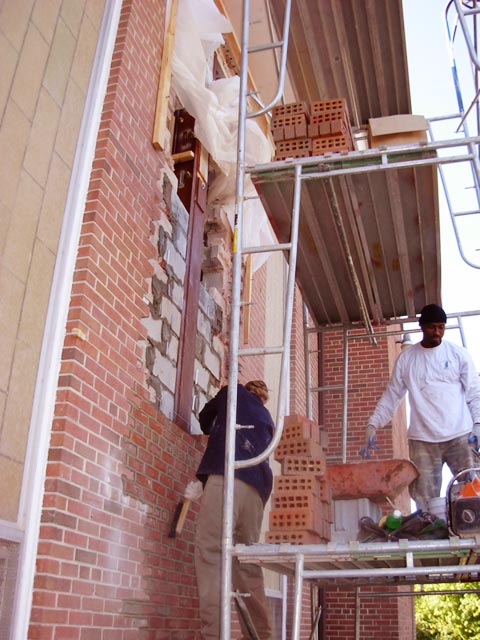Unlocking the Secrets of Lasting Masonry Building Practices for Eco-Friendly Buildings
In the realm of modern building and construction, the pursuit of lasting practices has ended up being critical. Among the myriad approaches to environmentally friendly structure, sustainable stonework building and construction stands out as a reliable and long lasting approach that holds a wealth of untapped capacity. From the option of products to innovative building and construction strategies, the keys to accomplishing sustainability within stonework construction are diverse and fascinating. By exploring the advantages, products, methods, and future trends of lasting stonework, a deeper understanding of how these practices can form the future of eco-friendly structures emerges.
Advantages of Sustainable Masonry Building And Construction
Embracing sustainable masonry building techniques not just decreases ecological influence but also provides lasting economic benefits to home builders and communities. By utilizing products like recycled blocks, obstructs, and stones, building contractors can dramatically lower the carbon impact of their tasks while advertising resource performance. Additionally, sustainable stonework building and construction strategies, such as appropriate insulation and thermal mass residential or commercial properties, can improve power effectiveness within structures, causing reduced functional costs in time.
Moreover, the longevity and durability of stonework frameworks add to lasting financial advantages. Buildings created making use of sustainable masonry practices frequently need much less repair and maintenance, equating to cost financial savings for building contractors and homeowner. The longevity of stonework materials additionally makes certain that frameworks continue to be steady and safe, reducing the requirement for regular renovations or replacements.
Eco-Friendly Masonry Products
Making use of environmentally friendly masonry products is a pivotal step towards enhancing the sustainability of building and construction practices and minimizing environmental influence while maximizing long-term financial benefits. Sustainable masonry products are sourced, generated, and used in a manner that decreases total ecological influence. Lasting concrete blocks integrate recycled aggregates and might include better insulation residential properties, contributing to power efficiency in structures.
Additionally, all-natural products like adobe, rammed planet, and straw bales give superb thermal mass residential properties, minimizing the need for heating and cooling energy. These materials are frequently locally available, promoting local economic situations and minimizing transportation-related carbon discharges. By choosing environmentally friendly stonework materials, construction jobs can substantially decrease their environmental impact and contribute to the production of much healthier, much more sustainable constructed atmospheres.
Energy-Efficient Stonework Strategies
Power effectiveness plays an important duty in improving the sustainability of stonework building methods. One vital energy-efficient stonework technique is the use of thermal mass, which includes including thick materials like concrete or block check over here right into the building's structure to soak up and save warm.

Developments in Sustainable Stonework
Current innovations in sustainable stonework methods have actually brought around cutting-edge techniques that are reshaping the construction sector. One such technology is the development of self-healing concrete, which makes use of microorganisms installed within the concrete to heal splits autonomously. This advancement not only minimizes upkeep expenses but likewise improves the resilience of masonry frameworks, adding to their sustainability.
Another noteworthy development is the use of recycled aggregates in masonry building - masonry contractor. By incorporating materials such as smashed ceramic waste or recycled glass into concrete blends, building contractors can decrease the ecological influence of building and construction tasks while keeping structural honesty. This method not only diverts waste from land fills however also saves natural resources, making it a key innovation in lasting masonry building and construction
Moreover, the integration of digital design tools, such as Building Info Modeling (BIM), is transforming the method stonework structures are intended and built. see this BIM allows for even more accurate estimations, minimized material waste, and enhanced power effectiveness, eventually leading to more sustainable building practices. These advancements collectively signify an appealing future for lasting stonework building in the period of environmentally friendly buildings.
Future Trends in Masonry Sustainability
With the innovative strides made in sustainable stonework techniques, the future trends in masonry sustainability are poised to further revolutionize the building sector. Among the vital trends forming the future of stonework sustainability is the raised combination of technology. Developments such as Building Info Modeling (BIM) and digital reality simulations are being used to Bonuses optimize stonework construction procedures, bring about minimized material waste and enhanced energy performance in buildings.
Moreover, the growth of novel lasting products is established to play a significant function in enhancing the eco-friendliness of masonry construction. masonry contractor. Innovations like self-healing concrete, recycled accumulations, and bio-based binders are obtaining grip for their capacity to reduce environmental influence while maintaining structural stability

Conclusion
In final thought, lasting stonework construction techniques offer numerous advantages for environmentally friendly structures. masonry contractor. Advancements in sustainable masonry are constantly being established to further improve the ecological efficiency of buildings.